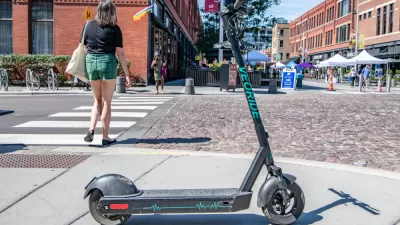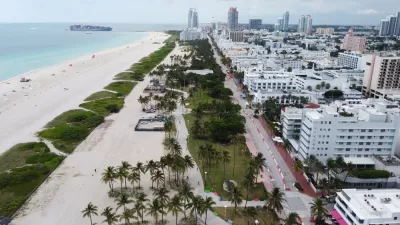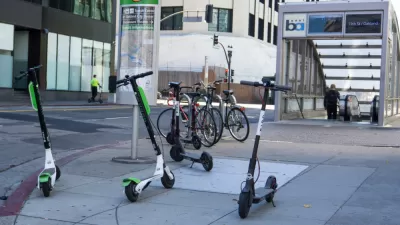Proposed regulations would limit the popular micromobility devices to two operators, impose new fees, and require more accountability for safe scooter use and parking.

After a surge in their popularity during the pandemic, San Diego’s rental e-scooters may see a dramatic decrease in their fleet. “In August 2021, NBC 7 reported a post-pandemic surge of 49% in the number of permitted motorized scooters.” Now, as reported by Artie Ojeda, “Under the rules proposed last week by the council’s Active Transportation and Infrastructure Committee, the number of operators could be significantly reduced to as few as two.” Additionally, “Chosen companies would be required to pay an annual $20,000 fee in addition to $0.75 a day per device. The number of devices would be capped at 8,000.”
To address concerns about sidewalk riding and use of public space, “Other rules would allow no more than four devices to be parked in a city striped corral. Scooters would not be allowed on sidewalks.” According to the article, “the proposed regulations are designed to make operators more accountable by requiring more data on self-enforcement.”
Operators of the micromobility devices have expressed support for the proposed regulations. The article quotes Sara Dodrill of Spin saying, “More regulation on operators allows us to continue investing in the infrastructure, technological, and operational innovations needed to make high quality and affordable shared micromobility services for San Diego residents and visitors.”
FULL STORY: New Rules Could Drastically Impact Use of Motorized Scooters in San Diego

Planetizen Federal Action Tracker
A weekly monitor of how Trump’s orders and actions are impacting planners and planning in America.

San Francisco's School District Spent $105M To Build Affordable Housing for Teachers — And That's Just the Beginning
SFUSD joins a growing list of school districts using their land holdings to address housing affordability challenges faced by their own employees.

The Tiny, Adorable $7,000 Car Turning Japan Onto EVs
The single seat Mibot charges from a regular plug as quickly as an iPad, and is about half the price of an average EV.

Seattle's Plan for Adopting Driverless Cars
Equity, safety, accessibility and affordability are front of mind as the city prepares for robotaxis and other autonomous vehicles.

As Trump Phases Out FEMA, Is It Time to Flee the Floodplains?
With less federal funding available for disaster relief efforts, the need to relocate at-risk communities is more urgent than ever.

With Protected Lanes, 460% More People Commute by Bike
For those needing more ammo, more data proving what we already knew is here.
Urban Design for Planners 1: Software Tools
This six-course series explores essential urban design concepts using open source software and equips planners with the tools they need to participate fully in the urban design process.
Planning for Universal Design
Learn the tools for implementing Universal Design in planning regulations.
Smith Gee Studio
City of Charlotte
City of Camden Redevelopment Agency
City of Astoria
Transportation Research & Education Center (TREC) at Portland State University
US High Speed Rail Association
City of Camden Redevelopment Agency
Municipality of Princeton (NJ)





























